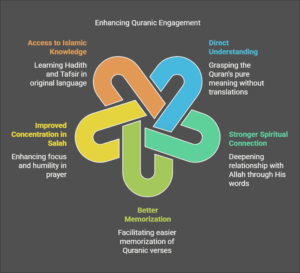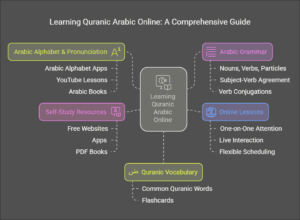Learning the Arabic language of the Quran is one of the most rewarding endeavors for any Muslim. The Quran was revealed in Classical Arabic, and understanding it directly—without translation—allows for a deeper spiritual connection and a better grasp of its divine message.
Whether you want to learn Arabic grammar to understand the Quran, take online Arabic lessons via Skype, or even learn Quranic Arabic online for free, this guide will help you:
✅ Understand the importance of learning Quranic Arabic
✅ Find the best ways to learn Quranic Arabic online
✅ Discover free and paid resources for mastering Arabic
✅ Improve your Quranic comprehension step by step
Let’s begin your journey to understanding the words of Allah directly!
Why Should You Learn Quranic Arabic?
📖 Allah revealed the Quran in Arabic
“Indeed, We have sent it down as an Arabic Qur’an that you might understand.” (Surah Yusuf 12:2)
Learning Arabic is essential to fully grasp the depth and beauty of the Quran. While translations can help, they can never capture the full meaning, linguistic precision, and spiritual essence of Allah’s words.
🌟 Benefits of Learning Quranic Arabic

✔️ Direct Understanding – No need for translations; experience the pure meaning of the Quran.
✔️ Stronger Spiritual Connection – Deepen your relationship with Allah through His exact words.
✔️ Better Memorization – Understanding Arabic makes it easier to memorize Quranic verses.
✔️ Improved Concentration in Salah – Comprehending the words in prayer enhances your khushoo’ (focus and humility).
✔️ Access to Islamic Knowledge – Learn Hadith, Tafsir, and Islamic texts in their original language.
How to Learn Quranic Arabic Online (Step-by-Step Guide)

✅ 1. Learn the Arabic Alphabet & Pronunciation
Before diving into Quranic Arabic grammar, you must learn:
🔹 The Arabic alphabet (Huruf Al-Hijaa’) – 28 letters with unique shapes and sounds.
🔹 Vowel Marks (Harakat) – Short vowels (Fatha, Kasra, Damma) that change pronunciation.
🔹 Letter Connections – How letters change shape depending on their position in a word.
📌 Recommended Resources:
✔️ Arabic Alphabet Apps – Try “Learn Arabic Alphabet” for beginners.
✔️ YouTube Lessons – Search for “Learn Arabic Letters with Tajweed“.
✔️ Arabic Books – Use Noorani Qaida to master pronunciation.
💡 Tip: Spend 15 minutes daily practicing reading and writing Arabic letters.
✅ 2. Learn Arabic Grammar to understand the Quran
Arabic grammar (Nahw) and morphology (Sarf) are the foundation for understanding Quranic Arabic.
📖 Important Grammar Concepts:
✔️ Nouns (Ism), Verbs (Fi’l), Particles (Harf) – The three basic word types in Arabic.
✔️ Subject-Verb Agreement – Sentence structure in Arabic vs. English.
✔️ Dual & Plural Forms – Arabic has dual (for two people) and multiple plural forms.
✔️ Verb Conjugations – Understanding past, present, and future tenses.
📌 Best Ways to Learn Arabic Grammar for the Quran:
✔️ Join an Online Arabic Course – Take structured lessons.
✔️ Use Interactive Grammar Apps – Try “Madinah Arabic”.
✔️ Download Arabic Grammar PDF Books – Free resources like “Gateway to Arabic“.
💡 Tip: Memorize common Quranic words to recognize patterns easily!
✅ 3. Learn Quranic Vocabulary & Common Phrases
Did you know? Only 300 words make up 70% of the Quran!
📌 Most Common Quranic Words:
✔️ Allah (الله) – God
✔️ Rabb (رب) – Lord
✔️ Rahma (رحمة) – Mercy
✔️ Ilm (علم) – Knowledge
✔️ Hudaa (هدى) – Guidance
📖 “And We have certainly made the Qur’an easy for remembrance, so is there any who will remember?” (Surah Al-Qamar 54:17)
💡 Tip: Use Flashcards to memorize new words daily!
✅ 4. Take Online Arabic Lessons via Skype
One of the fastest ways to learn Quranic Arabic is through live lessons with a tutor.
📌 Benefits of Online Arabic Lessons on Skype:
✔️ One-on-One Attention – Personalized lessons for faster progress.
✔️ Live Interaction – Ask questions and receive instant feedback.
✔️ Flexible Scheduling – Learn at your own pace, anytime, anywhere.
✔️ Affordable Learning – Many tutors offer low-cost or free trial lessons.
📌 Where to Find Online Arabic Lessons via Skype:
✔️ The Quran Courses Academy – Offers structured courses in Quranic Arabic.
✔️ Italki or Preply – Find Arabic tutors for live Skype lessons.
✔️ Madinah Arabic Course – Free self-study grammar lessons.
💡 Tip: Start with one lesson per week, then gradually increase as you improve.
✅ 5. Learn Quranic Arabic Online for Free (Self-Study)
If you prefer self-paced learning, you can learn Quranic Arabic online for free using these resources:
📌 Free Websites & Apps:
✔️ UnderstandQuran.com – Free interactive lessons.
✔️ Bayyinah TV – Quranic Arabic Course – Learn with Nouman Ali Khan.
✔️ LQ Toronto – Free Arabic grammar courses with PDF books.
✔️ Tarteel Quran App – Helps improve recitation while learning vocabulary.
💡 Tip: Commit to 30 minutes daily to see consistent progress.
FAQs About Learning Quranic Arabic
1. How long does it take to learn Quranic Arabic?
⏳ 3–6 months for basic reading & vocabulary
📖 1–2 years for full Quranic understanding
2. Can I learn Quranic Arabic without learning Modern Standard Arabic?
Yes! Quranic Arabic is simpler than modern Arabic, focusing mainly on classical vocabulary and grammar.
3. Is learning Arabic difficult?
Arabic has a unique structure, but with consistent practice, it becomes easier.
4. What’s the best method for learning Quranic Arabic quickly?
✔️ Take online Arabic lessons via Skype
✔️ Use flashcards for vocabulary
✔️ Listen to Quran recitation with translation
5. Can kids learn Quranic Arabic online?
Yes! Many academies offer child-friendly Arabic courses with interactive games.
Start Learning Quranic Arabic Today!
🎯 Follow this roadmap to success:
✅ Learn the Arabic alphabet & pronunciation
✅ Study Arabic grammar to understand the Quran
✅ Memorize Quranic vocabulary
✅ Take online Arabic lessons via Skype
✅ Use free resources to supplement your learning
📢 Ready to begin? Join The Quran Courses Academy today for expert Arabic lessons!
🔹 May Allah bless you on your journey to learn the Quranic Arabic! 🤲💙



